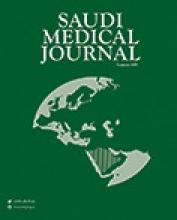Abstract
OBJECTIVE: It has been suggested from previous studies that there is an associated increased risk of coronary artery disease (CAD) in patients with Helicobacter pylori (H.pylori). However, others dispute this. We therefore evaluated this hypothesis in a group of patients with confirmed H.pylori infection.
METHODS: A total of 158 patients with dyspeptic symptoms were evaluated by esophago-gastro-duodenoscopy (EGD) in King Khalid University Hospital in Riyadh, Kingdom of Saudi Arabia from May through to June 1997. Endoscopic biopsies and histology as well as culture and serology for H.pylori were obtained. In patients with confirmed H.pylori a further analysis was performed looking at associated (CAD) or known risk factors for CAD.
RESULTS: Among the 158 patients who underwent EGD, 143 patients (90.5%) were found to have H.pylori either by culture, histology or serology, or both in a percentage of (31.5%) (77.6%) and (60.8%). There was no evidence of CAD in this group of patients based on history, electrocardiogram (ECG), echocardiography, ECG stress test, dypiridamole thallium scan or coronary angiography. Other known risk factors for CAD were cigarette smoking (12.6%), diabetes mellitus (10.5%), hypertension (1.4%) and hyperlipidemia (2.8%).
CONCLUSION: Helicobacter pylori infection does not increase the risk of CAD, and should not be considered as an independent risk factor for CAD. Further, prospective large trial is needed to confirm our finding.
- Copyright: © Saudi Medical Journal
This is an open-access article distributed under the terms of the Creative Commons Attribution-Noncommercial-Share Alike 3.0 Unported, which permits unrestricted use, distribution, and reproduction in any medium, provided the original work is properly cited.






